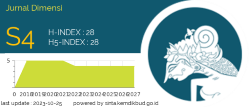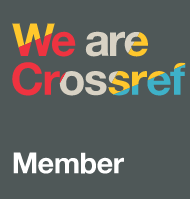HEDONIC SHOPPING DAN FLASH DISCOUNT TERHADAP IMPULSE BUYING DENGAN POSITIVE EMOTION SEBAGAI VARIABEL MEDIASI
Abstract
Keywords
Full Text:
PDFReferences
Fredrickson, B. L. (2001). The role of positive emotions in positive psychology: The broaden-and-build theory of positive emotions. American Psychologist, 56(3), 218–226.
Rook, D. W., & Fisher, R. J. (1995). Normative influences on impulsive buying behavior. Journal of Consumer Research, 22(3), 305–313.
Watson, D., Clark, L. A., & Tellegen, A. (1988). Development and validation of brief measures of positive and negative affect: The PANAS scales. Journal of Personality and Social Psychology, 54(6), 1063–1070.
Xu, H., & Zhang, K. (2023). The impact of flash sales on consumer skepticism and impulse buying: Evidence from e-commerce platforms. Journal of Retailing and Consumer Services, 71, 103–118.
YLKI (Yayasan Lembaga Konsumen Indonesia). (2024). Survei persepsi konsumen terhadap diskon e-commerce di Indonesia.
Gramedia. (2023, 29 Mei). Cara Menulis Daftar Pustaka Dari Buku, Jurnal, Skripsi, Artikel, Website. Diakses pada 22 Mei 2025, dari Gramedia.com.
Proof-Reading-Service.com. (2024, 1 Oktober). Cara Menulis Referensi untuk Makalah Penelitian Akademik & Ilmiah. Diakses pada 22 Mei 2025, dari proof-reading-service.com
Beatty, S. E., & Ferrell, M. E. (1998). Impulse buying: Modeling its precursors. Journal of Retailing, 74(2), 169–191.
Chen, Y., Wang, Y., & Xie, J. (2021). Online flash sales and consumer impulse buying: The role of urgency and scarcity. Journal of Business Research, 134, 367–376.
Darwipat, D. (2020). Pengaruh Flash Sale terhadap Perilaku Konsumen di Era Digital. Jurnal Ilmu Manajemen, 8(2), 112–120.
Fredrickson, B. L. (2001). The role of positive emotions in positive psychology: The broaden-and-build theory of positive emotions. American Psychologist, 56(3), 218–226.
Isen, A. M. (2000). Positive affect and decision making. In M. Lewis & J. M. Haviland-Jones (Eds.), Handbook of emotions (2nd ed., pp. 417–435). New York: Guilford Press.
Kotler, P., & Keller, K. L. (2016). Marketing Management (15th ed.). Pearson Education.
Li, Y., Wang, Y., & Wang, Y. (2020). The Impact of Flash Sales on Consumers’ Impulse Buying Behavior: The Mediating Effect of Positive Emotion. Journal of Retailing and Consumer Services, 55, 102–118.
Mehrabian, A., & Russell, J. A. (1974). An approach to environmental psychology. MIT Press.
Nurlaila, N., Ratnasari, S. L., Harsasi, M., & Sultan, Z. (2025). Bridging Ethics and Commitment: The Mediating Role of Islamic Work Values in Sharia Banking. Society, 13(2), 680–697. https://doi.org/10.33019/society.v13i2.840
Rahmawati, R., Oktora, K., Ratnasari, S.L., Ramadania, R., Darma, D.C. Is it true that lombok deserves to be a halal tourist destination in the world? A perception of domestic tourists Geojournal of Tourism and Geosites, 2021, 34(1), pp. 94–101.
Rahmawati, R., Ratnasari, S.L., Hidayati, T., Ramadania, R., Tjahjono, H.K. What makes Gen Y and Z feel stressed, anxious and interested in doing social tourism when pandemic? Cogent Business and Management, 2022, 9(1), 2084973.
Rook, D. W., & Fisher, R. J. (1995). Normative influences on impulsive buying behavior. Journal of Consumer Research, 22(3), 305–313.
Schiffman, L. G., & Kanuk, L. L. (2010). Consumer Behavior (10th ed.). Pearson Education.
Schwarz, N., & Clore, G. L. (1983). Mood, misattribution, and judgments of well-being: Informative and directive functions of affective states. Journal of Personality and Social Psychology, 45(3), 513–523.
Setyaningrum, R.P., Ratnasari, S.L., Soelistya, D., ...Desembrianita, E., Fahlevi, M. (2024). Green human resource management and millennial retention in Indonesian tech startups: mediating roles of job expectations and self-efficacy. Cogent Business and Management. 2024, 11(1), 2348718.
Susanto, A., Ratnasari, S. L., Susanti, E. N., Megah, S. I., Wilany, E., & Yuliani, S. (2024). Beliefs of English Language Instruction by Indonesian Elementary School Teachers: Exploring the Influence of Environment and Educational Background. AL-ISHLAH: Jurnal Pendidikan, 16(1), 1-13.
Sohn, S. H., & Lee, S. H. (2017). The effect of sales promotion on consumer positive emotion and impulse buying behavior. Journal of Business Research, 80, 197–206.
Tarwiyani, T., Ratnasari, S. L., Sari, M., Yanti, F., Hutagaol, N. M., Argadinata, M. P., & Ruslan, R. (2025). The Concept of Education in Malay Society from a Philosophical Perspective. JURNAL EDUSCIENCE, 12(2), 342-355.
Tjiptono, F. (2023). Strategi Pemasaran. Edisi revisi. Yogyakarta: ANDI.
Verhagen, T., & van Dolen, W. (2011). The influence of online store beliefs on consumer online impulse buying: A model and empirical application. Information & Management, 48(8), 320–327.
Wangi, A. (2021). Strategi Promosi Digital pada E-Commerce: Studi Kasus Flash Sale. Jurnal Manajemen Pemasaran, 13(1), 45–53.
Zakiyyah, N. (2018). Pengaruh Flash Sale terhadap Keputusan Pembelian Konsumen pada Marketplace Shopee. Skripsi. Universitas Negeri Semarang.
DOI: https://doi.org/10.33373/dms.v14i2.7720
Refbacks
- There are currently no refbacks.

This work is licensed under a Creative Commons Attribution 4.0 International License.











